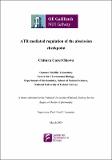| dc.contributor.advisor | Lowndes, Noel | |
| dc.contributor.author | Okowa, Chituru | |
| dc.date.accessioned | 2018-05-31T07:10:01Z | |
| dc.date.issued | 2018-05-30 | |
| dc.identifier.uri | http://hdl.handle.net/10379/7386 | |
| dc.description.abstract | Unperturbed mitotic cell division is essential for survival. For cells to complete mitosis, genetic material must be distributed equally between the new cells before the final abscission. Failure to complete chromosome segregation results in the formation of DNA bridges, chromosome instability and cancer. To protect genome integrity, cells have developed a highly complex and conserved process which coordinates the completion of chromosome segregation with abscission timing. The mechanism which ensures the completion of chromosome segregation before abscission is referred to as the ‘NoCut’ checkpoint in budding yeast and the abscission checkpoint in higher eukaryotes. The mitotic kinase Aurora B is known to be important for the successful execution of the abscission checkpoint.
The ATR kinase is an important mediator of the DNA damage response (DDR) and the replication stress response. ATR is activated during S phase to regulate origin firing, to prevent the collapse of stalled replication forks and to regulate repair of collapsed replication forks. The essential downstream target of ATR for these processes is CHK1. ATR also has a role in preventing entry into mitosis while DNA replication is ongoing, the so-called S-M checkpoint. In addition, to these ‘canonical’ DNA synthesis related roles, ATR has recently been shown to locate to R-loops at centromeres during pro-metaphase where, together with CHK1, it regulates the activation of Aurora B which in turn is required for successful chromosome segregation.
Here we show that during cytokinesis ATR localises to the cytoplasmic canal where it regulates abscission timing. Loss of ATR or inhibition of its kinase activity results in acceleration through cytokinesis indicating that ATR is a negative regulator of abscission. As a consequence of accelerated cytokinesis, there is an increase in the formation of binuclear cells. Using a quantitative proteomic screen in chicken DT40 cells, we identified Chmp4b as a novel interacting partner, an interaction that is conserved between human ATR and CHMP4B. CHMP4B is the ‘initiator’ of ESCRT III (Endosomal Sorting Complex Required for Transport III) polymerisation at the abscission site. The interaction between ATR and CHMP4B is enriched in mitosis and persists through cytokinesis. Furthermore, our data suggest that ATR negatively regulates the recruitment of CHMP4B to the midbody. Overall, we describe a new role for ATR during cytokinesis where it is a negative regulator of abscission timing. | en_IE |
| dc.publisher | NUI Galway | |
| dc.rights | Attribution-NonCommercial-NoDerivs 3.0 Ireland | |
| dc.rights.uri | https://creativecommons.org/licenses/by-nc-nd/3.0/ie/ | |
| dc.subject | ATR | en_IE |
| dc.subject | Abscission | en_IE |
| dc.subject | Checkpoint | en_IE |
| dc.subject | Natural sciences | en_IE |
| dc.subject | Biochemistry | en_IE |
| dc.title | ATR mediated regulation of the abscission checkpoint | en_IE |
| dc.type | Thesis | en |
| dc.contributor.funder | Science Foundation Ireland | en_IE |
| dc.local.note | Mitotic cell division is essential for all cell survival. In other to complete mitosis, the DNA must be distributed equally between the newly dividing cells before the final separation. Failure to complete this process results in chromosome instability and cancer. To prevent problems during mitosis, cells have developed a highly coordinated pathway which ensures the completion of chromosome segregation before abscission. This pathway is referred to as the ‘NoCut’ checkpoint in budding yeast and the abscission checkpoint in human cells. Aurora B is a protein known to be important for the successful execution of the abscission checkpoint. Here, we show that ATR regulates abscission timing. Inhibition of ATR activity causes the cells to accelerate through cytokinesis indicating that ATR is a negative regulator of abscission. We show that ATR and the protein, CHMP4B co-operate during mitosis. Furthermore, our data suggest that ATR negatively impacts the recruitment of CHMP4B to the midbody thereby delaying the separation of cells at the end of mitosis. | en_IE |
| dc.description.embargo | 2019-05-30 | |
| dc.local.final | Yes | en_IE |
| nui.item.downloads | 184 | |


